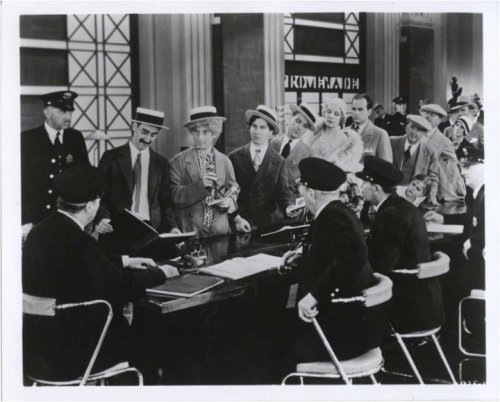September 19, 1931
Paramount
Comedy, Musical
DVD
B-
Well, I could've sworn that my view of the Paramount movies was that they got better and better, but this go-round, my first in a few years, I didn't find this as solid as Animal Crackers. Yes, there are some great bits-- the puppet show, the Groucho/Thelma scenes, and the Maurice Chevalier imitations-- but the Brothers need more structure to rebel against than a ship and a masquerade party. Also, there's too much of them picking on innocent victims, not only the man with the "frog in his throat" but most of the women they harass. I've been a Marx Brothers fan longer than I've been a feminist, so I'm not going to get overly p.c. about it, but it's not even funny harassment, except with the opera singer.
The opera jokes, as well as of course the stowing away, foreshadow A Night at the Opera (1935), but there's also a line that hints at A Day at the Races (1937), when someone's looking for a doctor and Groucho asks where the horse is. He even macabrely predicts Thelma Todd's death in a garage!
Chico meanwhile cracks what may well be his worst set of puns, including but not limited to "strawberry shortcut," "vessel" for "whistle," and "It's better to have loft and lost than never to have loft at all," which Groucho pats him on the back for. Harpo manages to "sing" along with his brothers in a barbershop quartet and later to, yes, impersonate Chevalier. Even Zeppo has things to do, making a joke ("What do we plug him with?"), romancing a girl, and fighting a henchman. Not only that, but Uncle Al Shean contributed to the screenplay, and Frenchie Marx, the seventy-one-year-old father of the Brothers, appears on the dockside. (He's got a mustache, a white hat, and a proud smile.) I didn't spot Billy Barty, uncredited except at IMDB, but I'm tagging him anyway.
This is the first of the Marxes' films to not be written for the screen, and it's also the first to feel more '30s than '20s, with Groucho making lots of jokes about money, like "Don't forget that the stockholder of yesteryear is the stowaway of today." Also, there's the gangster plot, in the same year as Robinson's Little Caesar and Cagney's Public Enemy. The Code is being ignored more obviously, as the studios tried to lure the Depression audience back into theaters. All Groucho's jokes about adultery-- Todd's, his, and that of the hapless party guests on the veranda-- would've been frowned upon a few years later.
The title this time is more straightforward, since it means "mischievous behavior."


No comments:
Post a Comment